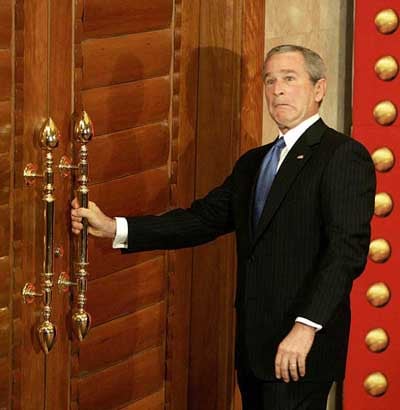Latest Gear Live Videos
Monday November 24, 2008 8:32 pm
The Bush Legacy

Posted by Charles Mitri Categories: Business, Domestic Policy, Editorials, Foreign Policy, Foreign Relations, History, US Economy, Wall Street, War,

When George W. Bush vacates the White House on January 20, 2009, the floodgates will open, as political pundits line up to take pot shots at his eight years as Chief Executive.
Presidential rankings are nothing new. Every former president has one and have eschewed the usual practice of getting an objective view of a president’s legacy after leaving office. These days, the Internet and instant readers’ polls have made the tried and true method of waiting a few years for a ranking virtually obsolete.
Down to business. America’s best presidents are a very elite group, usually judged by how well they react during a crisis. At the top of the heap there are Lincoln, FDR, Washington, Jefferson, Teddy Roosevelt and Woodrow Wilson. Over the last few years there’s been a shift in rankings at the bottom of the barrel. Grant and Harding used to occupy the number one and two slots. Over recent years, James Buchanan has assumed the bottom spot with Herbert Hoover right on his heels. Buchanan gets the blame for the Civil War. Hoover is charged with the 1929 stock market crash and onset of the Great Depression two years later.
To paraphrase Ricky Ricardo there will be lot of splainin’ to do once the Bush administration leaves office. What follows is an hypothesis on Bush’s eventual ranking and supporting reasons.
1) 9/11: While no evidence has surfaced that 9/11 was part of a conspiracy to give Bush the grounds to start full scale military operations in Afghanistan and Iraq, doubts still abound that Bush reacted quickly enough to halt the attacks on the Pentagon and World Trade Center. The Patriot Act, giving the president unwieldy power and how Bush used that power, usually gets the blame for ignoring constitutional rights and the Guantanamo Bay fiasco. Bush’s sluggish response to deploy FEMA in the wake of Hurricane Katrina only adds fuel to the fire. Many lawmakers were sufficiently displeased to ask if the president would respond in the same manner with a terrorist attack.
2) General costs of living: Gas prices peaked at $4.00 a gallon before consumer demand took a nosedive. Soaring gas prices also led to higher prices at supermarket checkout counters - store owners and food distributors had to charge more to transport goods. As a result, most Americans were forced to choose between heating their homes and buying food. Was Bush paying off Texas oil barons who financed his election campaigns? Again there is no evidence to support the accusation, but eventually the truth will be known.
3) Outsourcing: This proved to be one of the most disastrous decisions of the Bush administration. The president claimed that outsourcing was good for business and the economy. How? Not only did it take jobs out of the country, forcing unemployment to rise, but it also added insult to injury when companies got tax breaks while firing American employees. Outsourcing can also be linked to any number of recent fiascoes - the mortgage crisis, the Wall Street meltdown, and the bank crisis. Its simple economics. If people aren’t working, they can’t pay their bills, can’t afford their homes, can’t look for work and destroys their credit rating.
4) Foreign policy: If reports are accurate, George H.W. Bush warned his son against going into Iraq, saying that he’d never be able to get out. So what happened? The younger Bush invaded anyway and then had the audacity to claim that the next president would inherit the Iraqi conflict. In the process, violence escalated in Afghanistan and America alienated many of its European allies. The real coup de grace was - and is - the cost of maintaining a military presence in Iraq- - $10 to $20 billion a month in tax revenues.
Overall ranking
While the current recession and unemployment rates aren’t at Depression era levels, they’re bad enough to give Hoover a run for his money. 9/11 and the Patriot Act ushered in what some would compare to fascism. The rising cost of living and all its baggage, made life unbearable for most Americans. The Iraqi police action - only Congress can declare war - and subsequent alienation of European allies besmirched America’s reputation abroad. Little wonder that Bush’s approval rating dropped to 19%. To put that into perspective, Harry Truman left office with a 32% approval rating, followed by Nixon at 28%. Best guess scenario is that Bush will eventually overtake Hoover’s spot for the second worst president in our nation’s history.
- Related Tags:
- 9/11, abraham lincoln, civil war, congress, cost of living, depression, fdr, george w. bush, george washington, iraq, james buchannan, outsourcing, president rankings, thomas jefferson
Advertisement
Advertisement
Advertisement
© Gear Live Media, LLC. 2007 – User-posted content, unless source is quoted, is licensed under a Creative Commons Public Domain License. Gear Live graphics, logos, designs, page headers, button icons, videos, articles, blogs, forums, scripts and other service names are the trademarks of Gear Live Inc.


Comments:
Charles - excellent post and a great job with your measured defense in the comments above.
Having just read Walter Isaacson’s biography on Einstein, I am reminded of Einstein’s measured response to the problems of the early fifties.
First, there was the denial of Constitutional/civil rights to blacks, which Einstein empathized with: knowing personally how Jews were once similarly denied rights in his native Germany during the Nazi period.
Second, the McCarthy red scare days affected a number of his scientific colleagues. Despite being on the record opposed to any Communist efforts, the FBI had their file and certainly suspected even Einstein of having socialist sympathies. Einstein’s peers were investigated by the government in large numbers, surely denying them any number of civil rights in the process. (e.g., Oppenheimer, once the leader of America’s Manhattan Project, had his security clearance revoked [on the day before it would have expired anyways] for tenuous connections he had to Russia.)
After surviving these periods during which America violated its own Constitutional ethics, Einstein was buoyed by the way the government was built to make any losses of civil rights only temporary. At the end of his life, Einstein loved America most because of its ability to self-correct.
For whatever reason, call it Bush, call it 9/11, call it a sick mixture of the two, we have hit our national crisis. We can only hope that the constitution of our nation is enough to ensure that we can move towards a more successful path and that makes mistakes only after carefully considering every option.